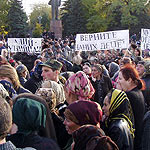Karachayevo tragedy may repeat
More tragic events may happen soon in Tatarstan, Bashkiria and other parts of the country

The revolution in Karachayevo-Cherkessia is over; the federal center supports changing of the republican government. Presidential envoy to the South federal district Dmitry Kozak said authorities would not allow illegal overthrowing of the republican government. 
The revolution began in the center of Cherkessk on November 9 with a meeting organized by relatives of seven locals found dead in a desolate mine. The seven people got lost somewhere close to the summer cottage of the republican president's ex-son-in-law, Ali Kaitov, on the night of October 11. The man is the director general of the Kavkazcement association. Some of the perished were shareholders of Kavkazcement, deputy of the republican parliament Rasul Bogatyrev among them.
Organizers of the meeting demanded investigation of the killing and resignation of President Batdyev. They also threatened they would go on hunger-strike. The meeting ended with an assault of the House of the Government. Relatives of the slain people rushed into the president's office and spent two days there. They left the office November 11 at night after Presidential Envoy Dmitry Kozak met them.
The talks were rather difficult for the envoy: he left the office seized by frantic people twice so that the protesters could discuss the situation. Still, the people demanded resignation of the republican president, prosecutor Vladimir Gannochka and other officials guilty of the tragic death of the seven people. However, Dmitry Kozak was inexorable and insisted that even just demands could not be satisfied that way.
The presidential envoy promised all necessary decisions would be taken for further resignation of high-ranking officials as soon as the investigation of the tragedy ended November 15. He added, president Batdyev would have to quit the post in case his connection with the crime is proved. Otherwise, dismissing of the republican president must be coordinated with the Constitution.
Dmitry Kozak told relatives of the slain people that some political forces were employing the tragedy for their own ends. “This week four people visited me and said they would make you stop the meeting within a couple of hours in case they are given ministerial positions in the government,” Dmitry Kozak said. The envoy did not name the visitors. However, a source at the Karachayevo-Cherkessia presidential administration told the Nezavisimaya Gazeta newspaper those were people who had supported ex-president Vladimir Semenov at the 2003 presidential election in the republic. It was said, those people and opposition deputies of the People’s Assembly seek vote of no-confidence to President Batdyev and his subsequent resignation.
Ex-president of Karachayevo-Cherkessia Vladimir Semenov told Nezavisimaya Gazeta “there is no opposition in the republic; people of the republic who are indignant at the criminal disorder are the opposition.” General Semenov explains that the events in the republic are the result of the corrupt vertical of power in the republic.
Expert opinion of the Karachayevo-Cherkessia tragic events
Assistant Professor from the Moscow Aviation Institute political science chair, political scientist and candidate of sciences Sergey Demensky says the events in the republic reveal a crisis in the regional authority. “It is not ruled out that similar events may happen in regions where governments are based on the same principle, the republics of Tatarstan, Bashkiria and others. Governors there have been keeping their positions for several periods already; they appoint their relatives directors of large enterprises to have better control over the region.”
Chairman of committee of directors at Popov Radio Plant in Omsk Tatyana Ushakova says the events in Karachayevo-Cherkessia have demonstrated the federal authority needs a new mechanism to prevent economic conflicts from developing into political ones. “Proprietors should settle their conflicts employing economic mechanisms and do not let regional authorities interfere.”
Doctor of historical science, senior research assistant at the Caucasus Department of the Russian Academy of Sciences Institute for Ethnology and Anthropology, an expert for Islam Abdul-Gamid Bulatov says: “To my mind, the recent events indicate some other processes have started in Northern Caucasus and the federal authority should treat them in a different way. After the break-up of the USSR some political figures of the Soviet epoch still managed to retain the power. These people have extensive experience of party activity. These people have managed to keep the situation rather stable in their regions. On the contrary, new leaders in other parts of the country provoked conflicts; let us take Chechnya for instance. These leaders allowed conflicts and wars with neighbors. ”
Subscribe to Pravda.Ru Telegram channel, Facebook, RSS!


